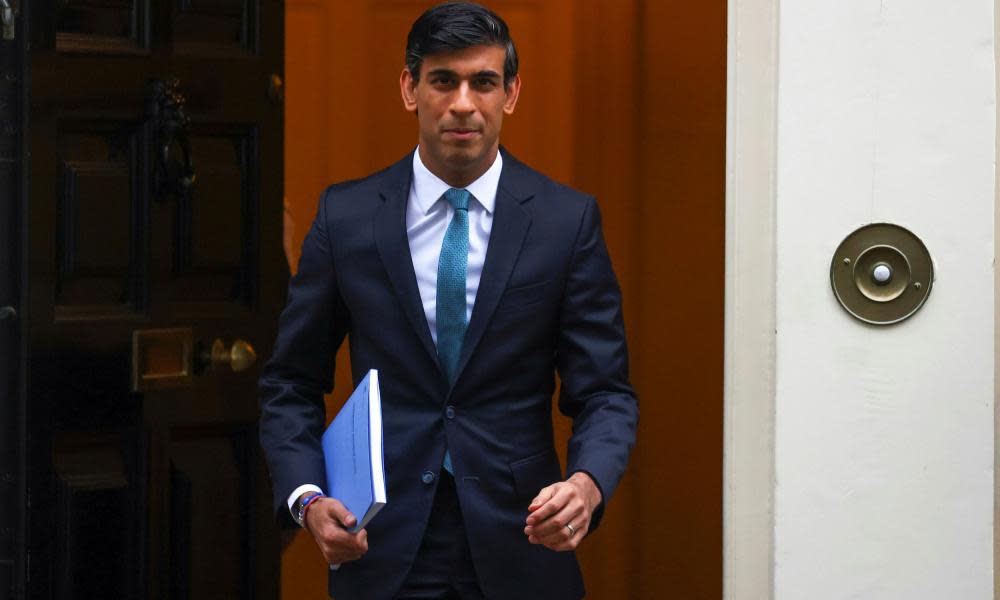Rishi Sunak's spending review 'will fail to kickstart green recovery'

A new infrastructure bank, to be based in the north of England, and an emissions-trading scheme covering large portions of industry were proclaimed by Rishi Sunak as evidence that the government is aligning its aim of rescuing the UK economy from the Covid-19 slump with its goal of cutting emissions to net zero by 2050.
But for the most part, experts said the chancellor’s spending review and infrastructure strategy failed to give the kickstart to the green recovery that economists have been advising and green campaigners have urged.
Of the £100bn to be invested in the UK’s infrastructure, only a fraction seems destined to reduce greenhouse gas emissions, while large portions of the spending are in danger of locking in high emissions far into the future. Road-building schemes will account for £27bn, and while housebuilding is a key aim there are few safeguards to ensure new houses will be zero-carbon. There is also little to guarantee that the £4bn “levelling-up fund” will avoid propping up the high-carbon economy.
Pedro Guertler, clean economy programme leader at the E3G thinktank, said: “The £1.1bn for green buildings is only 1% of the total [infrastructure] budget. This will not be enough to get on track to net zero.” He called for further multi-year funding for green buildings to give the supply chain confidence to invest.
Nick Molho, executive director of the Aldersgate Group of sustainable businesses, said: “A key task for the government in the near future will be to introduce new regulations and market mechanisms to drive private-sector low carbon investment in critical areas such as buildings, heavy industry and nature restoration.”
There was praise for the chancellor’s plan for a new national infrastructure bank, but experts warned that it must be given a clear mandate and adequate funding to ensure its investments drive a green economy. “A net zero mission must be put at the heart of the institution,” said Kate Levick, of E3G. “It must also be given full banking powers, an independent remit, and the capital needed to drive our green recovery.”
The government’s last attempt, the Green Investment Bank, was sold off only a few years into its mandate, so experts want the latest version to have a long-term vision. Lord Stern of Brentford, chair of the Grantham Research Institute on climate change at the London School of Economics, said: “The new bank should play a vital role in fostering sustainable infrastructure projects and programmes, in managing the risks associated with infrastructure, and in providing assurance to the private sector that it can invest with confidence.”
Green campaigners slammed the government for failing to follow through on pledges made last week of a “green industrial revolution” to shift the UK’s economy permanently to a low-carbon footing, set out in Boris Johnson’s 10-point plan to reach net zero emissions by 2050.
Shaun Spiers, executive director of Green Alliance, contrasted Sunak’s announcements with last week’s pledges. “The chancellor’s statement was a chance to back [the 10-point plan] with serious money, but he muffed it. The chancellor gave no sense that he understands the scale of the climate and nature emergencies, or the potential of the green economy for immediate job creation across the country.”
Rebecca Newsom, head of politics at Greenpeace, contrasted the UK’s attempts at a green recovery with those of EU rivals. “The chancellor appears not have pledged a single extra penny towards a green economic recovery today, while wasting tens of billions on polluting new roads,” she said. “This would be a failure for jobs, the economy and the future of our planet. France and Germany get it – they’re throwing a combined £63bn towards carbon-cutting stimulus measures.”
Mike Childs, head of policy at Friends of the Earth, added: “With billions of pounds earmarked for a climate-wrecking road-building programme, and inadequate funding for home insulation, eco-heating, buses and cycling, this strategy falls woefully short of what’s needed to meet the UK’s legally-binding targets for building a green future.”
There was concern at the lack of funding for infrastructure projects that restore the UK’s natural environment, despite assurances last week by the prime minister that it was a key aim. Hilary McGrady, director-general of the National Trust, said: “This year has shown how important nature and green space are to people. While we welcome confirmation that climate change and the environment remain an important priority for the government, we’ve not seen the long-term funding commitment to deliver the bold changes we need.”
Climate campaigners were also dismayed by the slashing of the international aid budget. Pledges by rich nations to provide at least £100bn a year to the developing world from this year, to help poor countries cut their emissions and cope with the impacts of climate breakdown, have been central to gaining support from the developing world for the Paris climate agreement.
For the UK to renege on its aid spending would send a damaging signal to the developing world, just as the UK prepares to host the next vital climate summit, campaigners warned. “The decision to cut the aid budget will fundamentally undermine the UK’s climate leadership. It will hinder poorer countries’ ability to tackle and adapt to the climate emergency, and sour the UK’s diplomatic relationships in the run-up to the crucial Glasgow climate conference next year,” Newsom said.


